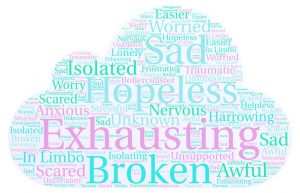LISTEN TO THIS ARTICLE:
One in every 6 couples will have trouble getting pregnant. Being that couple can be very lonely, especially when it seems like everyone around you is getting pregnant easily. Surviving the emotional upheavals of infertility may be one of the biggest challenges you face in your lifetime. Regardless of the cause, infertility can be devastating to both partners’ mental health.
How Infertility Affects Mental Health
The emotional, physical, and financial stress of infertility can cause levels of distress, depression, and anxiety similar to fighting a terminal illness such as cancer.
Uncertainty: It’s challenging to adapt to the loss of control and your ability to plan for the future.
Stigma: Many people feel ashamed, loney, and isolated about their fertility challenges.
Relationship strain: This time is intensely stressful and puts tension between partners when they need each other most. Well-meaning but misguided or insensitive advice and opinions from friends and family members strain
Financial worries: Benefits for fertility treatment are limited on most health insurance plans, so using assisted reproductive technology (ART) brings financial burdens and uncertainty.
Disrupted sex life: Timed intercourse, rising stress levels, and strained conversations can interfere with intimacy. This challenges healthy sexual relationships and even leads to sexual dysfunction.
Work-Life-Fertility Balance: Partners must navigate many fertility-related appointments and procedures while working full-time and often trying to hide their fertility challenges from bosses and coworkers.
Inadequate support for minorities: Infertility does not discriminate. Unfortunately, lack of cultural understanding or tolerance within the medical system can make infertility even harder for racial minorities and members of the LGBTQ+ communities. This added stress compounds fertility difficulties and hurts mental health.
Grief: For most, trying to conceive (TTC) will involve some kind of grief and mourning along the way. This emotional roller coaster comes when a pregnancy is lost, and some describe a sense of loss of their very identity. It is common for people to feel grief around losing their dream of having a child.

The unspoken pain of losing a pregnancy
Despite recent high-profile revelations of pregnancy loss from celebrities such as Meghan Markle, Christy Tiegen, and Michelle Obama, miscarriage is still a silent loss that many couples grieve on their own. This brings more shame, embarrassment, feelings of failure, and loneliness. There are several types of pregnancy loss encountered during ART:
Miscarriage: A miscarriage is a pregnancy loss before 20 weeks gestation. One out of five women who have become pregnant has experienced a miscarriage.
Chemical Pregnancy: A chemical pregnancy is a loss that occurs before five weeks. The embryo implants in the uterus, you may have a positive pregnancy test, but then the pregnancy does not continue.
The TWW and BFN: For couples going through ART, the two week wait (TWW in fertility lingo) between implantation and that first positive pregnancy test seems like a lifetime. If that pregnancy test is a BFN (big fat negative) that is a real loss that must be grieved. Unfortunately, many women feel that they cannot talk about their pregnancy losses. This makes it more difficult for them to grieve and heal, further putting them at risk for depression, anxiety, and psychological distress.
Mental Health and Infertility: Which Came First?
Research has been unable to completely untangle the intertwined relationship between infertility and mental health. Multiple studies show a higher prevalence of depression and anxiety in infertile couples when compared with fertile couples. It is not clear however, if the depression and anxiety might be the cause of the infertility or if the stress of infertility caused the depression and anxiety. Men with the clinical diagnoses of depression or anxiety do have lower sperm motility and numbers of sperm.
In stressful situations, such as infertility, it is common for the body’s “fight-or-flight” response to become activated. This complicated cascade of physical and emotional reactions is designed to help us quickly react and escape imminent danger. The problem is that the fight-or-flight response only evolved to be short-lived. It is unhealthy for our bodies and minds to be in constant fight-or-flight mode which can happen in chronically stressful situations, such as months or years of infertility treatments. More recently, mind-body stress-reduction interventions have shown success both in reducing depression and anxiety and improving successful pregnancy outcomes in infertile couples.
We do know that individuals with known mental health conditions that were there before the start of their infertility journey are at greater risk for mental health deterioration during fertility treatment.
Mental health risk for women
In general, women are at greater risk of experiencing mood disorders than men. They are also most likely to experience mood disorders during their childbearing years than they are at any other time in their lives. In one study, just under half of all women receiving fertility treatment (40%) met criteria for a psychiatric diagnosis; with generalized anxiety disorder most prevalent, followed by major depressive disorder, and then dysthymia. Furthermore, women who suffer from infertility have an increased risk of suicidal thoughts.
The medications women take as part of fertility treatments can make them more vulnerable to psychological distress. Many of the hormonal medications for in vitro fertilization (IVF) cycles can cause mood swings, depression, and increased anxiety. Women taking Clomid (synthetic estrogen clomiphene citrate) may have irritability, anxiety, sleep disruptions, and mood swings. Other medications used in fertility treatment can cause depression, mania, irritability, and thinking problems. Swings in estrogen and progesterone during treatment can impact serotonin levels and women who have already demonstrated a hormonal sensitivity may be at particular risk. This includes women with premenstrual dysphoric disorder (PMDD), prior postpartum depression, or increase cycling in bipolar disorders related to menstrual cycles.
Men hurt, too
In general men report lower levels of anxiety and depression during fertility treatments than women. However, the difference disappears when male infertility is the cause of a couple’s difficulty conceiving. In these cases, men exhibit levels of distress equivalent to those reported by infertile women.
Rarely do we hear about male infertility, even though male factor infertility could be the cause in half of all couples having difficulty conceiving. And the problem is only growing – studies indicate that male infertility has increased by 50% since 1973. This means that more and more men will be coping with infertility. Men diagnosed with male factor infertility report feelings of anger, frustration, loneliness, low self-esteem, shock, grief, and depression.
Men are less likely to talk about their feelings or seek emotional support during fertility. A recent survey of 2,000 UK men found that a quarter (25%) feel embarrassed about their fertility problems and another 18% felt isolated. This shame breeds silence, especially because culturally virility and masculinity are associated with being able to procreate.
There’s no reason to take the strong silent approach. There’s really nothing strong about being silent about male infertility. I tried that approach, and it doesn’t work. The longer I held my tongue about what I was feeling, the more isolated and angry I felt. Speak up. Speak out. And speak often. Chances are good you’ll find another infertile soul you can help, and won’t feel as alone in your own infertility. – Danny Ceizyk, Author of Almost a Father
Mental Health Support During Infertility
Increasingly, fertility treatment centers have counselors on staff and integrate mental health support within their treatment plans. Ideally, counseling should begin before patients start infertility treatment. Some specific types of therapy are more effective in terms of pregnancy outcomes. These are:
- Cognitive Behavioral Therapy
- Relational Therapy (especially couples therapy and sex therapy)
- Relaxation Techniques such as mindfulness meditation, deep breathing, guided imagery, yoga, acupuncture and hypnosis.
Finding the right therapist
A qualified counselor or therapist should have:
- A graduate degree in a mental health profession
- A license to practice and/or state registration
- Clinical training in the psychological aspects of infertility
- experience in the medical and psychological aspects of reproductive medicine
Here are some questions to ask when interviewing prospective counselors:
- What experience do you have working with infertility issues? Men with infertility? Couples? LGBTQ+ seeking parenthood? Are you currently seeing other people with infertility?
- What is your familiarity with reproductive medicine and ART?
- Have you worked with couples considering egg donation, surrogacy or adoption?
Here are some resources to help you find a mental health professional:
- Go to the American Society for Reproductive Medicine (ASRM) website to find members of the “Mental Health Professionals” group, searching by location.
- Ask your fertility clinic, reproductive endocrinologist, or urologist for names of therapists that he/she recommends.
- RESOLVE (the National Infertility Support Group) also has a searchable database to locate mental health professionals in your area.
Medications
Antidepressants and anti-anxiety medications can help with moderate to severe symptoms you might experience during fertility treatment. Several studies have compared the efficacy of psychotherapy with medications in the treatment of anxiety and depression in women with infertility. Compared with the SSRI Prozac (fluoxetine), cognitive behavioral therapy (CBT) helped women feel better. Unfortunately, SSRI’s can cause sexual dysfunction, lower libido and inhibit orgasm. While many mental health medications are safe in pregnancy, many couples feel nervous about any possible effects these medications could have upon a developing baby.
Some infertility medications can interact with psychiatric drugs. For example, birth control pills prescribed to regulate ovulation may decrease blood levels of certain anti-anxiety medications including lorazepam (Ativan), while increasing blood levels of others, such as alprazolam (Xanax) and the antidepressant imipramine (Tofranil).

For men struggling with erectile dysfunction, starting SSRI’s to treat infertility-related depression may not be the best option. SSRI’s have also been shown to cause reduced fertility in men, lower sperm counts, and cause damage to sperm DNA, so should not be used in men with low sperm counts or other conditions limiting their fertility. However, untreated depression and anxiety can also cause reduced libido, erectile dysfunction, and premature or delayed ejaculation, all of which can add to a couple’s problems getting pregnant. Thoughtful consultation with a psychiatrist, your fertility specialist, or urologist will help you make an informed decision about your treatment options.
For both men and women with a pre-existing mental health diagnosis it may make more sense to stay on your current medication regime in consultation with your fertility specialist or urologist, rather than risk worsening mental health during such a stressful process.
Surviving the Fertility Journey
We don’t choose to be infertile any more than we choose to have a mental health condition. Neither diagnosis defines who you are or whether you will be a loving parent. To be better prepared for the uncertainties and stress of infertility, seek help and support early in your journey. Support can come from friends, family, mental health professionals, doctors, and support groups. Learning how to communicate your needs will empower you as you soldier on in your journey. By doing so, you can also help end the silence and stigma surrounding both infertility and mental illness.

 Learn
Learn Read Stories
Read Stories Get News
Get News Find Help
Find Help
 Share
Share
 Share
Share
 Share
Share
 Share
Share



